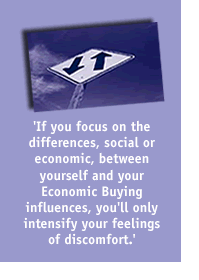
Losing Through Intimidation
| Ïðîäàæè | ||||
| Sales.com | ||||
| Closing | ||||
by Stephen E. Heiman, Diane Sanchez with Tad Tuleja
Every selling opportunity involves an Economic Buyer, the person who has the final say on whether your proposal is a "go" or a "no". Sometimes, the Economic Buyer might be a middle management employee whom you've known for years. Other times, it might be the vice president of the company. Often, when it's the latter, salespeople can feel uncomfortable, even intimidated. In preparing yourself to meet an Economic Buyer, your psychological readiness is just as important as your knowledge of your product or your observance of the common amenities such as making an appointment.
 There's
only one sure way we've found to overcome feelings of intimidation when
you confront a high-level executive. That's to remember that, although
the Economic Buyer for your sale might have a three-inch-thick carpet
and a four-car garage, he's still a human being—and it's to that human
being that you're selling.
There's
only one sure way we've found to overcome feelings of intimidation when
you confront a high-level executive. That's to remember that, although
the Economic Buyer for your sale might have a three-inch-thick carpet
and a four-car garage, he's still a human being—and it's to that human
being that you're selling.
We don't mean he's "just an ordinary Joe." He's not. In corporate America, people who play the role of the Economic Buyer are different, if only because they make more money than the rest of the population. But if you focus on the differences, social or economic, between yourself and your Economic Buying Influences, you'll only intensify your feelings of discomfort. You want to minimize those feelings. One way to do that is to remember the man or woman behind the glamorous role.
You might think of John Smith in simply functional terms, as the person who puts you in fear and trembling for your career because he has the power to release the funds for your sale. But maybe he's also a doting father, a lousy tennis player, a guy who danced in his socks at his high school reunion, a homeowner who waters his lawn on Saturdays and watches football and orders in Kung Pao Chicken, just like you. Just like you, too, he's got regrets about the past and hopes for the future and needs, both business and personal, that have to be attended to right now.
Here's the most important thing of all to remember: Since you're offering him a proposal, you are in a position to fulfill some of those needs. In order to do that, though, you have to learn whatever you can about him as an individual.
Again, as is so often the case when you're clearing away difficulties that stand in the way of your sales objectives, a reliable Coach (someone in or outside the buying organization who can give you information about the Buying Influence) can be a valuable asset. A good Coach can help you turn those difficulties into opportunities by providing answers to questions about the Economic Buyer's business needs, and about his or her personal interests as well.
Answers to the first type of question will help you identify which corporate Results your product or service can provide to the buying company. Answers to the second type of question will help you determine the Economic Buying Influence's personal Wins. Having your Coach brief you, before you make that first call, on what your Economic Buyer is like as a person is an excellent way of zeroing in on likely Win-Results—and thus of reducing your uneasiness in this key individual's presence.
Adapted
from The New Strategic Selling
Stephen E. Heiman, Diane Sanchez, with Tad Tuleja © 1998 by Miller Heiman,
Inc.
All rights reserved with permission of William Morrow & Company, Inc. and Warner Books